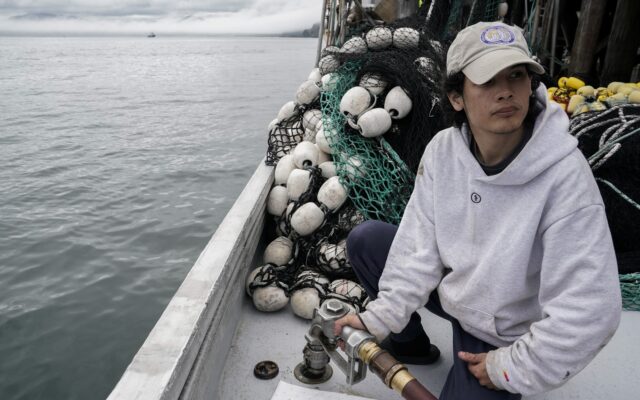As climate change and high costs plague Alaska’s fisheries, fewer young people take up the trade

KODIAK, Alaska (AP) — Lane Bolich first came to work in Alaska for the freedom and excitement that comes with being a fisher.
A self-described adrenaline junkie, Bolich moved from his hometown in rural Washington state because he loves being on the ocean even in cold winter weather and it gave him the chance to make more money than back home. After working as a deckhand for two years on a family friend’s boat, Harmony, he took the wheel as captain this year at just 20 years old.
Bolich is a rarity in an aging industry with high barriers to entry — equipment and access rights are costly — and increasing unpredictability as human-caused climate change alters marine habitats. As some fish populations dwindle and fewer people pursue the trade, fishers and conservation groups are actively working to bring in and retain the next generation of fishers through grants and training even as the industry continues to shrink in Alaska.
For the young people who do become commercial fishers, many see it as a way to make good money for a short time, while some others have a desire to sustain the industry for the long term in a way that benefits both fishers and fisheries. But with the obstacles outweighing the perks, young fishers are in short supply.
“There’s no future for an industry that doesn’t have young people coming in,” said Linda Behnken, the executive director of the Alaska Longline Fishermen’s Association. “They’re thinking about the long term health of the resource, the health of the industry and the fishing communities that they’re a part of.”
A 2018 study found the average age of fishers had increased 10 years from the previous generation to about 50 years old. Rural communities also lost 30% of their local permit holders as access rights consolidated and made it harder for new fishers to enter the industry.
But the biggest challenge, Behnken said, is climate change and what it means for the long-term health of the fishing stock and the industry. Research has shown that warming ocean temperatures may make fish habitats less suitable, leading to changing populations and different ecosystems, and the potential loss of commercially-important fish species.
“I think people recognize the future is less predictable in fisheries, that we’re going to see bigger fluctuations,” she said. “There’s just a lot more unknowns.”
These challenges are apparent to Bolich. He said working as a commercial fisher today means working to undo the damage to fisheries from harmful practices in the past like overfishing and understanding the impact climate change will have on fish populations.
“I think that the golden days of fishing are kind of behind us,” he said. “Now it’s kind of a recovery of trying to bring the fish back and trying to keep this viable way of making a living.”
Marissa Wilson, executive director of the Alaska Marine Conservation Council, noted that the decline in the number of people working coincides with the shrinking of fisheries in general as populations of fish decline and move. The high initial cost of access rights and equipment has also deterred some people from pursuing commercial fishing.
“It’s a handful of things coming into confluence at once that makes it difficult,” she said.
The Alaska Marine Conservation Council and the Alaska Longline Fishermen’s Association actively lobbied Congress for passage of the Young Fishermen’s Development Act, which passed in January 2021. As part of that act, the National Oceanic and Atmospheric Administration’s Sea Grant Office awarded about $1 million this year to help fund on-ship training and mentorship for young fishers in Alaska.
More training should help as finding reliable crew for boats is difficult, according to Darren Platt, captain of the Agnes Sabine, a salmon fishing boat based in Kodiak. When Platt started running his own boat in 2010, unemployment was high and labor was easier to find, but as jobs have become more available in the lower 48, Platt has noticed fewer people making their way to Kodiak to work. That loss of labor, combined with a lack of experienced career fishers, makes fully staffing a boat a challenge.
“We need to continuously bring in people from outside to come up and work,” he said. “And it’s usually college students or young folks looking for an adventure, but not career fisherman.”
For Juan Zuniga, a first-year deckhand on Platt’s boat, that sense of adventure and the prospect of making good money drew him to Kodiak from his home in Florida. Platt’s been teaching Zuniga everything he knows about working on a boat.
“This is a pretty far place from where I live so a very big step out of my comfort zone,” Zuniga said. “I still got a lot to learn.”
Retaining deckhands is key for Platt and he says he focuses on keeping crew members as comfortable as possible so that they might return again to work the following season.
For many though, contract work on a boat is a quick way to make money and gain experience for a different career. Sam Stern, a deckhand on the Big Blue, plans to pursue a career in marine engineering and worked this season to both make money for school and to earn hours at sea for eventual licensing he’ll need for that job.
“I guess people my age don’t really think about this as like a career,” Stern said, adding that he can make up to $20,000 in a single summer. “It is more of a way just to make money quickly.”
But fishing has become more than that for Bolich.
On the Harmony, Bolich is running between the deck and the cabin, grabbing power tools and fixing equipment before heading back out to sea to supply fishing boats and haul their catch back for processing. As captain, he has to know every aspect of every job and be able lead a crew older than himself. He admits his first year will be a learning experience, but he isn’t deterred.
He hopes to pass on what he’s learned to the generation after him, so Alaska’s fishing industry can live on.
“I want them to see a future in it,” he said. “Not just a dead end job.”
You Might Also Like



